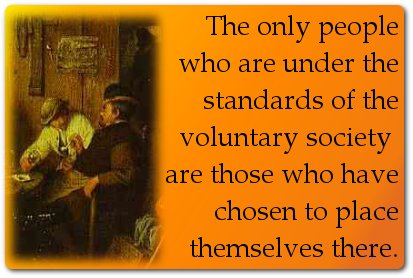Tolerance in Voluntary Societies
 Within involuntary societies, tolerance is generally a virtue. Not that every idea or action can be tolerated—far from it! Nevertheless, within an involuntary society, presumption should be on the side of tolerance. In any given instance, people who wish to deny tolerance must be required to provide clear and compelling reasons.
Within involuntary societies, tolerance is generally a virtue. Not that every idea or action can be tolerated—far from it! Nevertheless, within an involuntary society, presumption should be on the side of tolerance. In any given instance, people who wish to deny tolerance must be required to provide clear and compelling reasons.
In the present discussion, society simply means a relationship between two or more persons. An involuntary society is one into which the persons do not choose to enter and from which they cannot readily choose to withdraw. The most obvious example of an involuntary society is a nation or other civil unit. For a nation to exert unnecessary control over the actions or ideas of its people is tyranny.
A voluntary society, on the other hand, is one into which people may freely enter, and from which they may freely withdraw. Voluntary societies are formed for all sorts of reasons. Some are professional, others are religious, yet others are directed toward avocations, and some exist purely for the purpose of providing people with an occasion to meet other people. Voluntary societies may be organized formally or they may be informal movements or associations. Involuntary societies are held together by some form of necessity, and for them tolerance is generally a virtue. Voluntary societies, however, are held together by the commitment of their members to a common purpose. In order for them to survive, they must be intolerant with respect to their purpose.
Involuntary societies are held together by some form of necessity, and for them tolerance is generally a virtue. Voluntary societies, however, are held together by the commitment of their members to a common purpose. In order for them to survive, they must be intolerant with respect to their purpose.
Where no common purpose exists, a voluntary society will quickly dissolve. People are not willing to invest time, energy, or other resources in an association that offers nothing, does nothing, and stands for nothing. Therefore, if a voluntary society does not keep its sense of purpose clear, it will grow weak. Eventually it will either break apart or else be captured by a new and different purpose. In the latter case, it will have surrendered its original reason for existence and, as a matter of fact, have become an entirely different society.
The last point is critical. To the extent that the members of a voluntary society do not share commitment to its reason for being, the society as a whole will experience disorientation. Individuals will find themselves disputing the appropriate use of the society’s assets. When enough members no longer share the society’s original purpose, the assets will be diverted to some other use. At that point, the society ceases to exist as the original society and is actually displaced by a different society—although the new society may perpetuate the old name.
With respect to its purpose, therefore, a voluntary society cannot afford to be tolerant. Indeed, voluntary societies of all sorts are defined precisely by their intolerance. Their intolerance or exclusiveness as to their purpose is what gives them their existence and defines their character.
This is especially true in the case of societies that are committed to the propagation of ideas. In such instances, the idea itself is the core of the society. If it tolerates divergence from the core idea, the society effectively subverts the cause for which it exists.
Examples are not difficult to imagine. A society that is committed to the propagation of Marxian ideas cannot afford to have its work done by capitalists. A society of monarchists cannot allow democrats to promulgate their ideas in its name, and a society devoted to amillennialism cannot very well permit dispensationalists to determine its policies. If a voluntary society becomes tolerant at its point of purpose, it is resigning itself to ineffectiveness and eventual dissolution.
Voluntary societies are usually governed (formally or informally) by constitutions, credos, and codes of conduct. Many of the standards of these societies would be tyrannical if imposed upon an involuntary society, but within voluntary societies they are the agreements that give the society its own unique shape. For the most part, the content of such standards must be determined by the society itself. The values of the society will often seem unreasonable to outsiders, but what matters is whether they seem reasonable to the members of the society.
Voluntary societies get into trouble when their ideals and standards begin to seem unreasonable to their own members. Therefore, voluntary societies should be reluctant to adopt standards that are not related to their stated reason for existence. If standards are not necessary to the society’s purpose, members are likely to view them as unwarranted interference. When the annoyance caused by the interference outweighs the value of the society’s purpose, members may consequently choose to terminate their participation. The freedom of members to withdraw is exactly what makes a voluntary society voluntary.
This freedom explains why the intolerance of a voluntary society is not oppressive. When people no longer share the purpose of the society, they can leave it. When its standards and values become unreasonable, they can simply break their ties to it. Once they have left it, a truly voluntary society has no power to enforce or coerce their compliance.
The authority of a voluntary society extends exactly as far as the privileges of membership. If members no longer share the ideals of the society, then the society may terminate their membership. Once that step is taken, the society’s authority over the individual is at an end. It has no right to punish or coerce people who are not under its standards, and the only people who are under the standards of the voluntary society are those who have chosen to place themselves there. If the society attempts to take punitive measures that are not related to its membership (even against former members), then it becomes oppressive and tyrannical.
An involuntary society must value tolerance as a virtue. If a voluntary society attempts to enforce its level of intolerance upon an involuntary society, that is tyranny. When an involuntary society attempts to enforce its level of tolerance upon a voluntary society, that is also tyranny. In matters related to its purpose, a voluntary society must be intolerant. If it becomes tolerant about its reason for existence, then it will quickly cease to exist.
On Virtue.
Phillis Wheatley (c.1753-1784)
O thou bright jewel in my aim I strive
To comprehend thee. Thine own words declare
Wisdom is higher than a fool can reach.
I cease to wonder, and no more attempt
Thine height tʹ explore, or fathom thy profound.
But, O my soul, sink not into despair,
Virtue is near thee, and with gentle hand
Would now embrace thee, hovers oʹer thine head.
Fain would the heavʹn‐born soul with her converse,
Then seek, then court her for her promisʹd bliss.
Auspicious queen, thine heavʹnly pinions spread,
And lead celestial Chastity along;
Lo! now her sacred retinue descends,
Arrayʹd in glory from the orbs above.
Attend me, Virtue, throʹ my youthful years!
O leave me not to the false joys of time!
But guide my steps to endless life and bliss.
Greatness, or Goodness, say what I shall call thee,
To give me an higher appellation still,
Teach me a better strain, a nobler lay,
O thou, enthronʹd with Cherubs in the realms of day!

–––––-
This essay is by Kevin T. Bauder, president of Central Baptist Theological Seminary. Not every one of Central’s professors, students, or alumni necessarily agrees with every opinion that it expresses. In The Nick of Time is also archived here.
- 6 views

Discussion